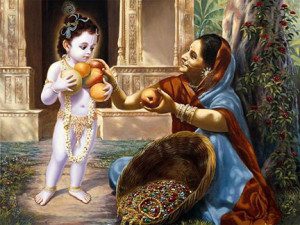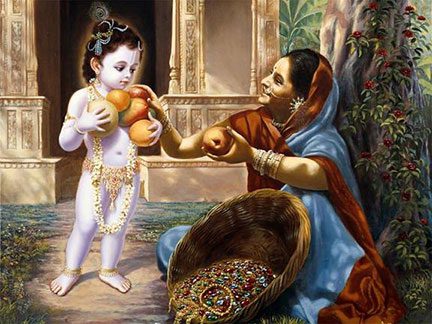Charity, Sacrifice and Austerity should not be given up
June 03, 2013 (VNN) by His Divine Grace A. C. Bhaktivedanta Swami Prabhupada
 In Bhagavad-gītā (3.9) it is said, yajnārthāt karmano ‘nyatra loko ‘yam karma-bandhanah: one should act or work only in order to please the Supreme Lord, otherwise one becomes entangled in the resultant reactions. According to the four divisions of varna and āśrama, ksatriyas and vaiśyas are especially advised to perform great ceremonial sacrifices and to distribute their accumulated money very liberally. Dhruva Mahārāja, as a king and ideal kshatriya, performed many such sacrifices, giving very liberally in charity. Ksatriyas and vaiśyas are supposed to earn their money and accumulate great riches. Sometimes they do it by acting sinfully. Ksatriyas are meant to rule over a country; Dhruva Mahārāja, for example, in the course of ruling, had to fight and kill many Yakshas. Such action is necessary for ksatriyas. A kshatriya should not be a coward, and he should not be nonviolent; to rule over the country he has to act violently.
In Bhagavad-gītā (3.9) it is said, yajnārthāt karmano ‘nyatra loko ‘yam karma-bandhanah: one should act or work only in order to please the Supreme Lord, otherwise one becomes entangled in the resultant reactions. According to the four divisions of varna and āśrama, ksatriyas and vaiśyas are especially advised to perform great ceremonial sacrifices and to distribute their accumulated money very liberally. Dhruva Mahārāja, as a king and ideal kshatriya, performed many such sacrifices, giving very liberally in charity. Ksatriyas and vaiśyas are supposed to earn their money and accumulate great riches. Sometimes they do it by acting sinfully. Ksatriyas are meant to rule over a country; Dhruva Mahārāja, for example, in the course of ruling, had to fight and kill many Yakshas. Such action is necessary for ksatriyas. A kshatriya should not be a coward, and he should not be nonviolent; to rule over the country he has to act violently.
Ksatriyas and vaiśyas are therefore especially advised to give in charity at least fifty percent of their accumulated wealth. In Bhagavad-gītā it is recommended that even though one enters the renounced order of life, he still cannot give up the performance of yajna, dāna and tapasya. They are never to be given up. Tapasya is meant for the renounced order of life; those who are retired from worldly activities should perform tapasya – penances and austerities. Those who are in the material world, the ksatriyas and vaiśyas, must give charity. Brahmacārīs, in the beginning of their lives, should perform different kinds of yajnas. Dhruva Mahārāja, as an ideal king, practically emptied his treasury by giving charity.
A king is not meant simply to realize taxes from the citizens and accumulate wealth to spend in sense gratification. World monarchy has failed ever since kings began to satisfy their personal senses with the taxes accumulated from the citizens. Of course, whether the system is monarchy or democracy, the same corruption is still going on. At the present moment there are different parties in the democratic government, but everyone is busy trying to keep his post or trying to keep his political party in power. The politicians have very little time to think of the welfare of the citizens, whom they oppress with heavy taxes in the form of income tax, sales tax and many other taxes—people sometimes have eighty to ninety percent of their income taken away, and these taxes are lavishly spent for the high salaries drawn by the officers and rulers.
Formerly, the taxes accumulated from the citizens were spent for performing great sacrifices as enjoined in the Vedic literature. At the present moment, however, almost all forms of sacrifice are not at all possible; therefore, it is recommended in the śāstras that people should perform sankīrtana-yajna. Any householder, regardless of his position, can perform this sankīrtana-yajna without expenditure. All the family members can sit down together and simply clap their hands and chant the Hare Krishna mahā-mantra. Somehow or other, everyone can manage to perform such a yajna and distribute prasāda to the people in general. That is quite sufficient for this age of Kali. The Krishna consciousness movement is based on this principle: chant the Hare Krishna mantra at every moment, as much as possible, both inside and outside of the temples, and, as far as possible, distribute prasāda (sanctified food that is first offered to Krishna). This process can be accelerated with the cooperation of state administrators and those who are producing the country’s wealth. Simply by liberal distribution of prasāda and sankīrtana, the whole world can become peaceful and prosperous.
Generally in all the material sacrifices recommended in the Vedic literature there are offerings to the demigods. This demigod worship is especially meant for less intelligent men. Actually, the result of such sacrifice goes to the Supreme Personality of Godhead, Nārāyana. Lord Krishna says in Bhagavad-gītā (5.29), bhoktāram yajna-tapasām: He is actually the enjoyer of all sacrifices. His name, therefore, is Yajna-purusha.
Although Dhruva Mahārāja was a great devotee and had nothing to do with these sacrifices, to set an example to his people he performed many sacrifices and gave all his wealth in charity. For as long as he lived as a householder, he never spent a farthing for his sense gratification.
In Bhagavad-gītā (18.5) Lord Krishna says:
yajna-dāna-tapah-karma
na tyājyam kāryam eva tat
yajno dānam tapaś caiva
pāvanāni manīsinām
“Acts of sacrifice, charity and penance are not to be given up but should be performed. Indeed, sacrifice, charity and penance purify even the great souls.”
Even one who has renounced the world and has taken sannyāsa should not renounce chanting the Hare Krishna mahā-mantra. Renunciation does not mean that one has to renounce sankīrtana-yajna. Similarly, one should not renounce charity or tapasya. The yoga system for control of the mind and senses must be strictly followed. Lord Rishabhadeva showed how severe types of tapasya could be performed, and He set an example for all others.
[Bhaktivedanta Purport to the Srimad Bhagavatam 4.12.10 and 5.6.2]

